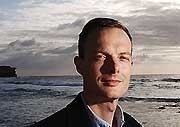Nobel Peace Prize: UNSW helps climate of change
UNSW climatologist Andy Pitman has cause to celebrate the 2007 Nobel Peace Prize won by Al Gore and the UN's Intergovernmental Panel on Climate Change.
UNSW climatologist Andy Pitman has cause to celebrate the 2007 Nobel Peace Prize won by Al Gore and the UN's Intergovernmental Panel on Climate Change.

UNSW atmospheric scientist Andy Pitman has cause to celebrate the winning of the 2007 Nobel Peace Prize by Al Gore and the UN's Intergovernmental Panel on Climate Change.
A member of the IPCC, Professor Pitman has over the past decade been a leading contributor to IPCC reports describing the human contribution to global warming and climate change. An expert in climate modelling, he was lead author of part of the recent global report card.
Professor Pitman, a co-director of UNSW's Climate Change Research Centre (CCRC) with Federation Fellow Professor Matthew England, is leading some 60 academics across the university in an integrated research program addressing all aspects of climate change, from its causes to its impact on communities, public health, the law, the built environment and the economy.
"It is wonderful that this voluntary effort has been recognised by the awarding of this year's Nobel Prize," Professor Pitman said. "The IPCC Chairman Dr Rajendra Pachauri and the chairs of the IPCC working groups have provided outstanding leadership representing a scale of endeavour that truly warrants this prize."
Professor England praised Professor Pitman, saying: "He has been one of only a few Australian climate scientists to regularly lead author IPCC Chapters in the past decade. His contribution is in the key area of climate model evaluation. The IPCC Assessment Reports are the definitive works that inform policy-makers on the science and impacts of climate change, and climate change mitigation. They are a massive undertaking to write, with lead authorship reserved for those at the very forefront of their field."
UNSW played host to Dr Pachauri in August when he delivered the Jack Beale Memorial Lecture. He said that nations like Australia should "act resolutely on the basis of the scientific evidence" that global warming is due to greenhouse gas emissions from human activity.
Dr Pachauri said that major developing countries such as China and India were watching developed countries such as Australia and the US for signs of serious action on cutting greenhouse gas emissions.
The Nobel Committee acknowledged former US Vice President Al Gore and the IPCC for their efforts to "build up and disseminate greater knowledge about man-made climate change, and to lay the foundations for the measures that are needed to counteract such change.
"Through the scientific reports it has issued over the past two decades, the IPCC has created an ever-broader informed consensus about the connection between human activities and global warming," Ole Danbolt Mjoes, chairman of the Nobel Committee, said in making the announcement. "Thousands of scientists and officials from over 100 countries have collaborated to achieve greater certainty as to the scale of the warming."